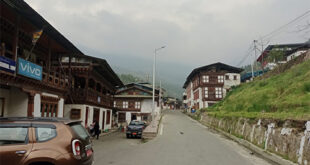The continuous hike in poultry feeds has hit the poultry farm owners hard across the country and few are already on the brink of closing their business due to zero-profits and losses incurred.
This is the fifth time that such a hike came into force within a period of less than two years with a kilogram of feed price escalated to Nu 29 from May this year from Nu 11 in early 2012.
The poultry sector has, so far, achieved almost 100% self-sufficiency in eggs and chicken production in almost in 20 dzongkhag with annual contribution to GDP from the poultry sector estimated at Nu 224mn.
The Annual Livestock Conference held in February last year discussed the mission for cent percent self- sufficiency with eggs. However, the import of eggs in the country had plummeted to six million eggs in 2010 from 13 million in 2009. About 22 million eggs and 116 metric tons of chickens are produced annually.
The livestock officials also highlighted on the tremendous progress, particularly in the poultry and dairy sector, in the 10th Five Year Plan.
In what could be the biggest blow to the agriculture ministry’s efforts to boost home-produced eggs, the poultry owners are already closing down their business.
The decline in the price of eggs and the rising cost of poultry feed have deterred the people from starting poultry farms. Poultry farming, once a profitable business, is now seen as a loss-making venture having to feed the pullets with expensive feeds.
According to one of the poultry owners in Dewathang, Samdrup Jongkhar, Jinpa Tharchen a kilogram of feed last year was Nu 11 and the eggs were sold at Nu 12 generating huge income and it was encouraging to expand the farm.
He also added that the current cost of feed has risen to Nu 29 and the eggs are sold at Nu 8 bringing an immense loss to him and his poultry farming group.
“If this continues there is chance of reverting import of eggs and the government must save the farmers by providing subsidy on feeds, if we are looking for self sufficiency,” he said. “I see this is only the way out if we are looking for maintaining self-sufficiency,” he added.
While another disappointed poultry owner Tshewang Tenzin from Khaling under Trashigang said that marginal profits can be obtained onlyif more than 350 birds are kept and with hundreds birds at the backyard farm, he comes into loss.
He said that the increase in feed prices came down hard on him, and further he claims that with increase in feed, the price the quality feeds that they fed to the chicken dwindled. “I do not get enough quality feed to give to my growing poultry population.”
He also said that due to lack of quality and inaccessibility of feeds, the number of fowls has dropped down. “We have to now resort to feeding our fowls with grains,” he added.
However, this is far from being a solution as poultry owners say when fed with such inferior quality feed, the production drops.
Yet another poultry owner from Tsirang said that if the feed price keeps increasing time and again, he would rather choose to close his farm than run a loss-making business. “The government should intervene for rising feed cost, so that farmers can afford to buy quality feed for the animals.”
He said that the lone established feed mill in Bhutan, Karma Feed resorts to set up feed cost inopportunely when farmer do not have other alternatives to procure feeds.
However, such a hike in feed price, according to Karma Feed, is due to the increase in cost of the ingredients that is used for preparing the feed. The cost of numerous ingredients has risen continuously, because of which they have no option but to increase the price of the feed.
As of now there are more than 2,800 commercial poultry farms in the country including the group-owned and single-owned poultry farms.
 The Bhutanese Leading the way.
The Bhutanese Leading the way.



